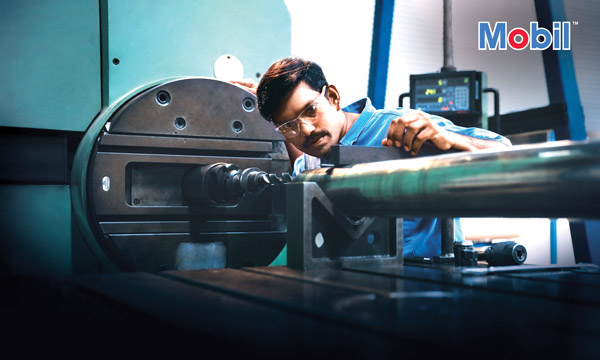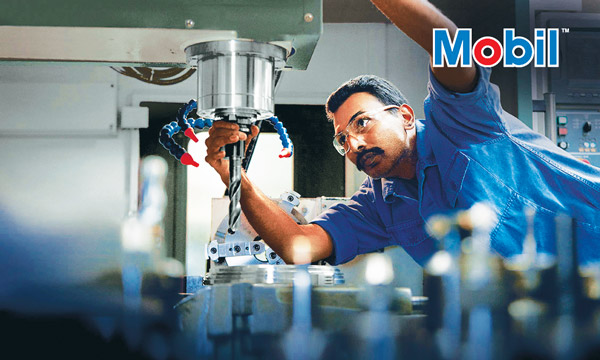Advertorial: Cut Friction with Right Lubricant
 Mobil Industrial Lubricants are developed by working closely with leading equipment builders. These lubricants are specially formulated to protect the equipment, ensure problemfree operation in extreme temperatures and tough conditions, and to provide longer lubrication intervals.
Mobil Industrial Lubricants are developed by working closely with leading equipment builders. These lubricants are specially formulated to protect the equipment, ensure problemfree operation in extreme temperatures and tough conditions, and to provide longer lubrication intervals.
Be it the simple pro duc t ion of nuts and bolts or a complex metalworking process, friction and heat are synonymous with the operations of any shop floor. While the heavy-duty processes require machines to be both precise and efficient in their working, lubricants play a vital role in cutting the friction and boosting the machine’s performance. With companies looking for ways to reduce costs and increase profitability, many players in the metalworking industry are focused on reducing wastage – and downtime – by switching to lubricants with longer shelf life and higher efciency. Choosing the right lubricant ensures that the machine tools run smoothly with minimum friction, delivering maximum output.
The Friction Factor
Friction is the force that opposes the relative motion of two surfaces in contact. Opposing surfaces scrape against each other producing surface wear and tear due to the friction created. Friction can be ‘static or breakaway’, which comes into motion when a machine at restis turned on. Herein, the force applied to turn the shaft must frst overcome the interactions between the two surfaces. As the shaft begins to rotate, the ‘dynamic or kinetic’ friction comes into play. As a result of the shaft rotation, lubricant is ‘dragged’ into the contact zone, which reduces surface-to-surface interactions and thus causes friction forces to drop. With increasing speed, the lubricant flm in the contact zone increases and friction drops further. When surfaces are fully separated by the lubricant, friction is reduced to a minimum. If speed continues to increase, friction also increases as the lubricant flm grows thin.
Smooth and precise slideway operations require special attention to the friction properties of the lubricant. Loss of frictional control can cause inaccuracies, which in a metal removal process, ultimately results in loss of machine tool productivity. Hence it is important to have the right lubrication solutions that cut friction and protect the machine to enhance efciency and improve productivity.
Stick-Slip Effect
Slideways, also referred to as linear bearings, operate along similar lubrication principles. The difference is that the two surfaces in contact are now flat and the motion is linear instead of rotational. While a plain bearing is designed to operate under hydro-dynamic conditions and theoretically could do so forever, slides have to stop when the end of the way is reached, and start moving again in the opposite direction. Terefore, and because slideways typically operate in a stepwise manner, mixed lubrication plays a more important role. Most signifcantly, slideways are far more susceptible to a phenomenon known as stick-slip due to the large amount of time that they operate in a mixed-lubrication regime.
 Stick-slip is a phenomenon caused by continuous alternating between static and dynamic friction. It can occur when static friction exceeds dynamic friction, and when there is some elasticity in the system. When a driving force is applied, high static friction prevents the slide from moving immediately. Instead, the force is loading the spring, by which the driving force exerted on the slide is gradually increased. When the force of the spring exceeds that of the static friction, the slide starts moving. Due to the change from static to dynamic friction the spring force accelerates the slide, while the spring unloads rapidly. Eventually the spring is completely unloaded and starts opposing the slide movement. The slide slows down, while friction for mixed lubrication grows rapidly, until fnally the slide comes to a halt and the cycle starts all over again. Tis jerky movement is what is often referred to as stick-slip.
Stick-slip is a phenomenon caused by continuous alternating between static and dynamic friction. It can occur when static friction exceeds dynamic friction, and when there is some elasticity in the system. When a driving force is applied, high static friction prevents the slide from moving immediately. Instead, the force is loading the spring, by which the driving force exerted on the slide is gradually increased. When the force of the spring exceeds that of the static friction, the slide starts moving. Due to the change from static to dynamic friction the spring force accelerates the slide, while the spring unloads rapidly. Eventually the spring is completely unloaded and starts opposing the slide movement. The slide slows down, while friction for mixed lubrication grows rapidly, until fnally the slide comes to a halt and the cycle starts all over again. Tis jerky movement is what is often referred to as stick-slip.
This is especially true for slideways, where stick-slip causes jerky movements of the slide and by extension, the attached work piece or tool. Such uncontrolled motion can result in inaccurate machining operations, unacceptable finished part quality and production losses. To facilitate smoother operations, special additives called friction modifers can be added to the lubricant to allow for better friction control. Modern slideway lubricants usually contain a synergistic mix of friction-modifying additives that enable accurate and smooth operation over a range of operating conditions.
Versatile New-Age Lubricants
Modern machine tools and slideway designs demand more of the applied lubricants. Increasing speeds and loads as well as greater expectations for machine accuracy require highly sophisticated slideway lubricants. In addition, there are an increasing number of friction material pairings, like metalon-plastic, that have different lubrication needs. The modern slideway lubricants meet these challenges with a carefully balanced combination of base oils and additives to achieve low static friction for easy start-up, continuous transition from rest to movement and smooth movement even under heavy loads.
It is critical to choose the right slideway lubricant for machine tools that will help to improve the productivity of the equipment, protect the parts as well as prevent friction stick-slip. Tere are several recognized friction tests to demonstrate frictional properties of slideway lubricants such as Cincinnati Lamb Friction Test, SKC Tribometer and Darmstadt Rig Test, which enable evaluation of static and dynamic friction characteristics of a lubricant and the effect of various slideway materials.
The Mobil advantage
Mobil Industrial Lubricants are developed by working closely with leading equipment builders. Mobil engineers gain deep insights into equipment trends and lubrication requirements to guide lubricant researchers and formulators in designing highly effective lubricants. Tese lubricants are specially formulated toprotect the equipment; ensure problem-free operation in extreme temperatures and tough conditions, and to provide longer lubrication intervals. Available in a range of viscosity, to offer customers the right choice for their applications, Mobil industrial lubricants help cut friction, enhance performance, reduce waste and improve productivity.
